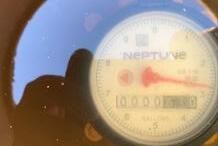
5 minute read
Mental Health: Peer-to-Peer Conversations
Nathan Lines, Drinking Water Circuit Rider
As operators you have an unlimited number of resources available to you to tackle almost every situation you come across. If you need to figure out your monthly water loss, you can go to your MRWA Tools App, punch in how many gallons of water you pumped and how much you sold, and just like that, you have a quick percentage of water loss without even breaking out the calculator. If your system has a water leak and you are not sure of the location of the leak, you can pick up the phone and call MRWA, and a circuit rider or other field staff will bring out advanced leak detection equipment and do everything in their power to pinpoint that leak, saving you time and money. But what do you do when there is a situation where there might not be an abundance of resources to help you with?
Advertisement
As you become operators, you go through training and classes and get a certificate that says you can operate a water/wastewater system. You are expected to know all the answers to everyone’s questions and concerns about your system or town. In most cases, if you work in a small town, you wear many hats. Not only are you the operator of the water or wastewater system, you are also responsible for the streets, and parks, and general maintenance of everything in your town. With all those hats comes stress and responsibility. This is the situation I talk about when I say there are not a lot of resources available to us. The mental health of operators is a topic that I have never seen a training class on. It was not discussed during my operator certification classes or in the manual when I studied and took my certification tests.
l would like to share a story about a situation that happened to me years ago as an operator. One summer morning in June during the heart of baseball season, I got my monthly shut-off list to disconnect unpaid customers, as I did every month. Now shutting off anyone at first is rough on you, but after a few months of doing it, you start to get used to it. But this month was different and the reason being is, as I started to do my shutoffs, I realized that one of the people on my list was a family that had a boy on the baseball team that I coached. As I pulled up to the front yard, this little boy that thinks I am Superman or something great comes running out his front door and yells, “Hey Coach! What ya doing?” At that moment, my world got really small, and I had to tell this young man that I was turning off his water because it was part of my job, and I did not like doing it, but I had to. That young man did not understand and how could he? I had not done anything wrong, yet I felt so terrible. Later that afternoon at practice that normally happy cheerful young man was not himself. I knew he was confused and did not understand why I would have shut off his water. His parents glared at me as most people do that get their water shut off by you. In that moment, in that day, I was not proud to be an operator. I did not like my job and I did not like the way it made me feel.
Mental health of public works and water operators is a topic that does not receive much, if any, attention, but I know the struggle and the stress that these positions can force upon us. Most of the customer feedback you get is only the negative. Rarely does anyone seem happy with something you have done. It is a very thankless job.
So, what do we do to fill the void where there are not a lot of resources available to help with these types of circumstances? If you are like me, most of the time you bottle it up and keep working because that is what we think we are supposed to do. But that does not work in the long term, so I strongly suggest you reach out to other operators. Peer-to-peer conversations about these circumstances,
telling stories and reminiscing on the good and bad experiences you have had as an operator is a great way to “lighten” the burden while learning from others’ experiences. As you begin to talk to other operators, and you also listen to their stories and experiences, it will help with understanding your own. Peer-to-peer conversations can lead to so many good things. I have learned tricks and tips that other operators do that have helped me in the past. Things that I had not even thought of or knew existed, I learned from talking to another operator.
So how do we meet other peers? Well, the best place I know to do this is one of the MRWA Conferences. Operators from all over the state gather to learn about current topics going on in the water and wastewater industry. There are classes to fit a wide array of operations, vendors galore showing off all the newest and greatest products used in the industry, and best of all, there are operators from every size system and town that you can meet and talk to and learn from each other. I conclude by sharing that I am a US Armed Forces veteran and mental health issues with co-workers, present and past, have made a significant impact on my life. If you need someone to talk to please reach out to family, friends, coworkers; anyone that will listen. It’s okay to ask for help.












